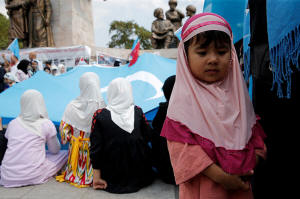China lobbies countries to praise its rights record ahead of UN review -
diplomats
 Send a link to a friend
Send a link to a friend
 [January 22, 2024]
By Emma Farge [January 22, 2024]
By Emma Farge
GENEVA (Reuters) - China has been lobbying non-Western countries to
praise its human rights record ahead of a key U.N. meeting where it will
face questions and criticism over its actions in Hong Kong and Xinjiang,
according to diplomats and documents.
Four diplomats told Reuters that China's mission at the United Nations
in Geneva had been sending memos to envoys in the build-up to the review
of Beijing's record by the U.N. Human Rights Council scheduled for
Tuesday.
China's mission did not respond directly to a request for comment on the
reported lobbying. In a statement, it said Beijing "firmly opposes the
politicization of human rights" and "promotes a fairer and more just,
equitable and inclusive global human rights governance".
Tuesday's review will be the first since the U.N.'s top rights official
released a report in 2022 saying the detention of Uyghurs and other
Muslims in China's Xinjiang region may constitute crimes against
humanity. China denies any abuses.
Later that year, members of the U.N. Human Rights Council, including
Indonesia and the United Arab Emirates, voted down a motion backed by
the United States and other Western members that called for a debate
about the alleged abuses in Xinjiang.
In early January this year, a diplomatic note sent by China's diplomatic
mission to countries, seen by Reuters, read: "I would kindly request
your delegation to render valuable support to China and make
constructive recommendations in the interactive dialogue ... taking into
account the friendly relations and cooperation between our two
countries."

Other notes sent to three non-Western countries seen by Reuters included
specific speaking points to raise, including comments praising China's
record on women's rights and disability.
An African diplomat speaking on condition of anonymity confirmed having
received a request to show support for China at the meeting and said he
would do as asked.
Antigua and Barbuda in its advanced questions to the U.N. used a
favoured phrase of President Xi Jinping - referring to China's
"whole-process people's democracy" and praising the "fuller and more
extensive and comprehensive democratic rights" enjoyed in China.
Its mission did not respond to a request for comment.
RIGHTS 'TEMPERATURE CHECK'
Tuesday's review will be China's first since 2018.
[to top of second column]
|

Ethnic Uyghur girls attend a protest against China, in Istanbul,
Turkey August 31, 2022. REUTERS/Dilara Senkaya/File Photo

China's mission told Reuters its government "attaches high
importance to this UPR (Universal Periodic Review) cycle", referring
to the U.N. rights council's regular reviews of countries' rights
records.
Beijing would send a large delegation and hoped to conduct a
"dialogue on the basis of equality and mutual respect," it added.
Diplomats said that other countries sometimes tried to influence
others' statements at the U.N. council but that the scale of Chinese
lobbying was exceptional.
"The UPR is a very important temperature check and a chance for
countries to signal concern on the basis of U.N. documentation,"
Raphael Viana David from the International Service for Human Rights
said. "It shouldn't be a joint effort of praising each other and
holding hands."
An usually high number of countries, 163, have submitted requests to
make speeches at the session.
The United States, which sent two pages of advanced questions, asked
China to cease what it called human rights abuses including unjust
detention, forced labour and reprisals across the country and in
Tibet, Hong Kong and Xinjiang, U.N. documents showed.
Germany asked how many people were in Xinjiang detention centres.
China routinely rejects foreign criticism of its human rights
record, saying all Chinese are treated equally in accordance with
the law and that foreign countries should not interfere.
While the U.N. council has no legally binding power, its debates
carry political weight and criticism can raise pressure on
governments to change course or elicit updates on the fate of
individuals.
A protest is planned on Tuesday outside the U.N. building with
Tibetan, Uyghur and Hong Kong activists and Chinese dissidents.
The U.N. will publish a list of recommendations later in the week
and a report is due to be adopted in June or July.
(Reporting by Emma Farge; Additional reporting by Laurie Chen in
Beijing; Editing by Andrew Heavens)
[© 2024 Thomson Reuters. All rights reserved.]This material
may not be published, broadcast, rewritten or redistributed.
Thompson Reuters is solely responsible for this content. |